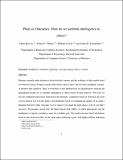| dc.contributor.author | Kryven, Marta | |
| dc.contributor.author | Ullman, Tomer D | |
| dc.contributor.author | Cowan, William | |
| dc.contributor.author | Tenenbaum, Joshua B | |
| dc.date.accessioned | 2021-12-08T15:49:08Z | |
| dc.date.available | 2021-12-08T15:49:08Z | |
| dc.date.issued | 2021-09 | |
| dc.identifier.uri | https://hdl.handle.net/1721.1/138377 | |
| dc.description.abstract | Humans routinely make inferences about both the contents and the workings of other minds based on observed actions. People consider what others want or know, but also how intelligent, rational, or attentive they might be. Here, we introduce a new methodology for quantitatively studying the mechanisms people use to attribute intelligence to others based on their behavior. We focus on two key judgments previously proposed in the literature: judgments based on observed outcomes (you're smart if you won the game) and judgments based on evaluating the quality of an agent's planning that led to their outcomes (you're smart if you made the right choice, even if you didn't succeed). We present a novel task, the maze search task (MST), in which participants rate the intelligence of agents searching a maze for a hidden goal. We model outcome-based attributions based on the observed utility of the agent upon achieving a goal, with higher utilities indicating higher intelligence, and model planning-based attributions by measuring the proximity of the observed actions to an ideal planner, such that agents who produce closer approximations of optimal plans are seen as more intelligent. We examine human attributions of intelligence in three experiments that use MST and find that participants used both outcome and planning as indicators of intelligence. However, observing the outcome was not necessary, and participants still made planning-based attributions of intelligence when the outcome was not observed. We also found that the weights individuals placed on plans and on outcome correlated with an individual's ability to engage in cognitive reflection. Our results suggest that people attribute intelligence based on plans given sufficient context and cognitive resources and rely on the outcome when computational resources or context are limited. | en_US |
| dc.language.iso | en | |
| dc.publisher | Wiley | en_US |
| dc.relation.isversionof | 10.1111/cogs.13041 | en_US |
| dc.rights | Creative Commons Attribution-Noncommercial-Share Alike | en_US |
| dc.rights.uri | http://creativecommons.org/licenses/by-nc-sa/4.0/ | en_US |
| dc.source | PsyArXiv | en_US |
| dc.title | Plans or Outcomes: How Do We Attribute Intelligence to Others? | en_US |
| dc.type | Article | en_US |
| dc.identifier.citation | Kryven, Marta, Ullman, Tomer D, Cowan, William and Tenenbaum, Joshua B. 2021. "Plans or Outcomes: How Do We Attribute Intelligence to Others?." Cognitive Science, 45 (9). | |
| dc.contributor.department | Massachusetts Institute of Technology. Department of Brain and Cognitive Sciences | |
| dc.relation.journal | Cognitive Science | en_US |
| dc.eprint.version | Author's final manuscript | en_US |
| dc.type.uri | http://purl.org/eprint/type/JournalArticle | en_US |
| eprint.status | http://purl.org/eprint/status/PeerReviewed | en_US |
| dc.date.updated | 2021-12-08T15:42:52Z | |
| dspace.orderedauthors | Kryven, M; Ullman, TD; Cowan, W; Tenenbaum, JB | en_US |
| dspace.date.submission | 2021-12-08T15:42:53Z | |
| mit.journal.volume | 45 | en_US |
| mit.journal.issue | 9 | en_US |
| mit.license | OPEN_ACCESS_POLICY | |
| mit.metadata.status | Authority Work and Publication Information Needed | en_US |
